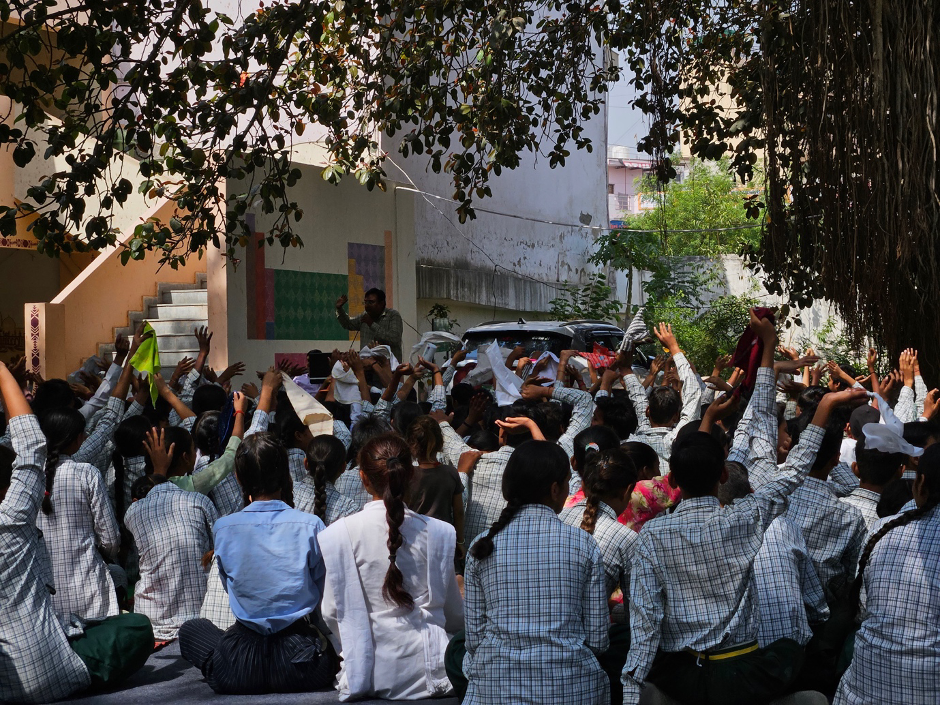Why COVID-19 and falling oil prices are a threat to education in Nigeria

COVID-19 will exacerbate pre-existing educational inequalities in Nigeria
Image: REUTERS/Akintunde Akinleye
Stay up to date:
Nigeria
- The IMF projects that Nigeria's economy will contract by 3.4% in 2020, a fall from the previously anticipated 2% growth;
- The COVID-19 pandemic and collapse in oil prices are both significant contributing factors;
- Federal and state budgets for education are already insufficient and likely to decline further.
The immediate costs of the COVID-19 pandemic to education in Nigeria are evident. With school closures persisting for months, students, especially the most vulnerable, are missing out on learning. The government and individual schools are adapting by switching mediums and delivering learning through digital platforms, but the stark digital divide (in terms of both infrastructure and knowledge) that plagues the country exacerbates pre-existing educational inequalities.
The cost of recovery will be high, but the sector will inevitably be confronted with a costlier issue: between the effects of the pandemic and crashing oil prices, the fiscal space to fund basic education is going to shrink significantly.
The dual shock of COVID-19 and crashing oil prices to revenue
The prolonged disruption in economic activity due to the pandemic combined with the collapse of oil prices and the reduction in demand for Nigeria’s oil products are severely impacting Nigeria’s fiscal position. The IMF projects that the economy will contract by 3.4% in 2020, a fall from the previously anticipated 2% growth. The total budget, which was set at N10.59 trillion (~$27.3 billion) is in the process of being revised downward by about 15%.
Oil and gas exports, which make up around 76.1% of Nigeria’s total exports and more than half of revenue, are predicted to fall drastically, with oil revenue being revised downward to N924 billion ($2.38 billion) from N2.64 trillion ($6.8 billion). Non-oil revenue targets have also been revised downward by 10% percent, as industries across all sectors continue to grapple with the effects of the pandemic-induced disruption in economic activity. In sum, total revenue has been adjusted downward by 34%.
Dissecting the effect on education financing
While we don’t know the full extent of the economic crisis on education spending, we can attempt a prediction by looking at education spending during and after the most recent oil crisis in 2014, and factoring in accessible education expenditure information at both the federal and state levels.
Looking at a past oil crisis - a decline in education prioritization
We analysed GDP and education spending during the 2014 oil price crash, where a fall in crude oil prices from $100/barrel to $52.65 led to a decline in total budgetary allocation from N4.694 trillion (more than $12.1 billion) to N4.493 trillion ($12.1 billion) in 2014. The fall in crude oil prices negatively affected total allocation to education, as it declined from N496.783 billion ($1.28 billion) to N484.26 billion ($1.25 billion), but the share of the education budget was maintained, increasing slightly to 10.7%.

In 2016, crude oil prices further declined to $43.73, but total budgetary allocation grew to N6.06 trillion ($16 billion). At the time, the government was able to increase the budget (by increasing debt), however, given the country’s current debt burden and the global nature of the pandemic, borrowing conditions could be unfriendly and borrowing could further worsen the country’s fiscal crisis.
Despite this increase, the budget for the education sector was reduced to N480.278 billion ($1.24 billion) in 2016. The increase in budget and the decline in education spending led to a decline in the education budget by 3 percentage points in 2016.
Since 2016, and before the current oil crisis, oil prices have been recovering slowly and both the total budget and allocation to the education sector have increased consistently. However, the education sector budget, as a share of total budget allocation, has steadily declined since, reaching its lowest level of 6% in 2020.
Understanding the federal budget
Nigerian budgets have tended to neglect the education sector in the past. In general, government spending is relatively small when compared with other African countries.

Prior to the current economic crisis, the education financing budget wavered around 9-10% of public expenditure between 2008 and 2014, against the recommended 15% to 20%. Despite an increase in the total budget by more than 255% between 2008 and 2020, the education expenditure as a share of the total budget has fallen from 9.64% to 6.32% within the same period.

Public spending on education as a share of GDP has remained below 1% since 2010 against the recommended 4-6% and has decreased steadily since 2011, from 0.67% to 0.44% in 2020.

The current economic crisis signifies that there will be a reduction in total budgetary allocation to the education sector, which would further dent the already neglected sector. The original education allocation for 2020 was N653 billion ($1.68 billion), roughly 6% of the total budget expenditure. Of this, N111.789 billion ($288.2 million) is the statutory transfer from the Federal Government (FG) to the Universal Basic Education (UBE) fund, which covers the FG’s contribution to basic education in Nigeria.
Given the proposed cut in the budget, dataphyte, an open data organization, reports that the FG has proposed a reduction in its budgetary allocation to education by almost 55%. This reduction is reflected in the government’s statutory transfer to the UBE Fund. Other than the proposed UBE cut, we don’t yet know how the total education budget will be affected by the proposed budget cut; however, if the proportion of education spending were to remain the same (6%), and the budget was cut by 15%, the federal education budget is expected to be around 541 billion ($1.39 billion). This means that there could be a further reduction in education spending by N51 billion ($131.5 million), which will affect other aspects of education spending outside of basic education.
Further, a quick back-of-the-envelope calculation that accounts for Nigeria’s revised growth projection, current education spending as a per cent of total budget reveals that education spending could fall as low as N500 billion ($1.29 billion) this year.
The issue of state funding
Unfortunately, there is a dearth of information on state budget and spending on education across all states, which makes it difficult to infer the potential impact of the present economic crisis on state education expenditure. However, given the fact the lockdown measures and restriction on movements across states have taken a massive toll on the country’s economy, it is inevitable that this would result in budgetary shortfalls across all states in the country due to decreased tax revenue from all revenue streams.
State revenue is accrued through taxes and tax revenue is expected to decline given the reduction in sales, job losses and income cuts induced by lockdown measures and the slowdown in the economy. Compounded by the need to increase public health spending across states in order to combat the virus, state budgets will also be adversely affected.
Given that we don’t know how much is being spent on education at the state levels, we cannot make a confident projection of how much state education budgets will fall. What we do know is this: public (basic) education will suffer both during and after the pandemic.
Recommendations for achieving education goals
Nigeria continues to lag behind in terms of education financing and with the current national and global economic outlook the prospects for increased financing in the immediate future are bleak. Given this, the government will need to make difficult decisions about how and where to channel scarce resources available at both the national and sectoral levels. With this in mind, there are a few crucial things to consider:
1. Prioritizing education funding: While there are a lot of moving parts involved in improving access to quality education and, inadvertently, education outcomes, one thing remains particularly significant: money. Money is a necessary underlying condition for achieving education goals. Increased access to financial resources provides the scope to achieve non-finance related education targets.
2. Supporting evidence-informed decision-making: Money matters, but how money is spent is critical too. All resource allocation decisions made within the sector should be augmented by three activities: tracking the use of funds, measuring its outcomes/impacts against expected results, and making necessary adjustments based on findings.
3. Develop a strong National Education Account: Collating data on all education funding across the country is important because it allows us to glean vital information, such as whether the problem is inadequate funding or improper use of available funding. Building a strong and holistic National Education Account (NEA) will allow us to see not just how much money is spent on education across Nigeria, but to determine who is spending money and on what.
Don't miss any update on this topic
Create a free account and access your personalized content collection with our latest publications and analyses.
License and Republishing
World Economic Forum articles may be republished in accordance with the Creative Commons Attribution-NonCommercial-NoDerivatives 4.0 International Public License, and in accordance with our Terms of Use.
The views expressed in this article are those of the author alone and not the World Economic Forum.
Related topics:
Forum Stories newsletter
Bringing you weekly curated insights and analysis on the global issues that matter.
More on Education and SkillsSee all
Naoko Tochibayashi
September 17, 2025
Shankar Keshav Prasad
September 15, 2025
Emilian Axinia
September 11, 2025
Alexander Shevchenko
September 4, 2025
Corinne Brenner and Mandë Holford
September 4, 2025







